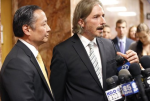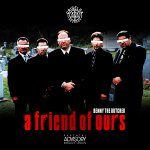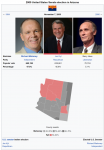Frogs
- Pronouns
- he/they is fine
During his presidency, Édouard Balladur was regarded as the "right man for the right time" in France. In 1995, Balladur was elected president of France in what Jacques Chirac, the man who had been aiming for the top job for decades, called the "Great Betrayal", as Balladur had originally rejected to run in 1995 against Chirac, before simply deciding to do so anyway when polls saw him leading the field. Balladur's election destroyed the two mens friendship, but many in France felt like they made the "right choice", at least until 2007. See after the fall of the Cold War consensus, the United States and Russia's relationship was softening, even after Yury Vlasov took power following the death of Boris Yeltsin, and although he would grow to be unpopular internationally in the 2010s, he had good relations with both presidents Kerrey and Quayle. With this, the French, who had never really let their empire go, began to feel that they wanted to wage international power. Balladur began establishing closer relationships with Israel and Saudi Arabia, who were growing increasingly unhappy with the U.S. and Russia (especially as the "JDL panic" took the US by storm following the 1996 attacks), and with various Bavarian independence groups, feeling similar to Mitterand that a truly united Germany would undermine French power. Still, it wasn't until the events of 2001 and 2002 that Balladur's influences would be truly felt.
Despite decolonization officially occurring throughout the 1950s and 1960s, the French never truly relinquished control of Northern Africa, and under Balladur, things were no different. French influence was felt across Northern Africa, from the Algerian Civil war to multiple coups held in Niger throughout Balladur's term. However, the lasting thorn in France's side was Libya. Muammar Gaddafi had long annoyed the French (and the rest of the West) with his anti-colonial politics, support for the IRA, and claims that it was a Soviet puppet state. However, in the post-Cold War world, there was hope for peace. Thanks to the help of Nelson Mandela, President Kerrey was able to meet with Gaddafi following his re-election in 1996 (ironically helped by French-American voters), and the two established more cordial relations with each other. Kerrey had long been decried as a warmongerer by the paleoconservative right (the invasion of Iraq to create Kurdistan and the bombings of the former Yugoslavia didn't help), but it was joked that "only Kerrey could go to Libya". Such "cordial" relations were continued under Quayle, who didn't really care about Gaddafi, as his election was based on his willingness to "fix American problems". With this, the French, who had long hated Gaddafi, saw an opening. Gaddafi's turn to Pan-Africanism over Pan-Arabism scared the French (and the British, as Gaddafi had become a supporter of Robert Mugabe), and as such, Gaddafi would meet his end in 2001, when a French-backed assassin shot Gaddafi. The resulting fallout from the assassination and an attempted coup days later led to the beginning of the Libyan Civil War, which hasn't truly ended. The French and British both backed the increasingly right-wing and radical Islamists, who committed various atrocities across the country as the rest of the world watched. This was in junction with the Franco-British coup of Mugabe a year later, and the world soon returned to war.
Balladur once famously stated in a speech in 2002 that "in the absence of the Americans" under President Quayle, that the west needed a new leader. As he was re-elected easily over increasingly radical socialists, it seemed as if the Gaullist wanted to be the one to do it. Balladur became "Israel's #1 ally" as Quayle almost completely ignored them, and with Libya taking center stage, the French seemed poised to at least partially return to their former glory. This led to the creation of what would be called the "British-Saudi connection". It was well known that the Islamist rebels the French funded were heavily violent. This was a necessary evil many reasoned with. What wasn't necessary was everything else. The British-Saudi connection was a quiet agreement, where Islamist forces, needing more than just revenue from their backers, would get involved in drug and occasionally human trafficking. As the increasingly annoyed French and British parliaments refused higher funds, Libyan Islamist forces were making millions selling heroin to the Corsican Mafia, which was being spread worldwide by either the Corsicans or their Costra Nostra allies. This money went to private British, French, Israeli, and Saudi arms traders, or even just straight up to the campaigns of Balladur and Blair. The human trafficking aspect was even more horrifying, as modern slavery was pretty much being condoned by major powers as Libyans would straight up sell many of their captured opponents, particularly to leaders of the Saudi oligarchy.
Still, the connection was mostly covered up until 2007. It was then that independent journalists found proof of Islamist forces trafficking heroin and even people during the war. This was no surprise, after all, it was a necessary evil, and they had arguably committed much worse. However, as they dug deeper, they found increased knowledge of French and British knowledge of the trading, and even financial connections to leaders of both country's political causes. The scandal came to light on September 11, 2007, the day known as "Black Sunday" in French history, and many pointed out that the scandal resembled both Watergate and Iran-Contra. President Quayle called on both Blair and Balladur to step down, and international condemnation was sent out. Balladur called upon his opponents to "prove it beyond a reasonable doubt", but took his own life in his office 3 days later. Blair stayed alive to stand trial, but would end up dying in prison in 2015 due to a disease caused by poor prison conditions. In both countries, the scandal caused a crazed response. In Britain, where no Tories had even sniffed office for a decade, and Norman Lamont, a Eurosceptic and harsh conservative (but ironically a member of Le Cercle), was swept into office as Labour fell behind even the Liberal Democrats. Meanwhile in France, the heavily Unionized and often angry populace began to riot, even as Prime Minister-turned-President François Léotard called for national unity, the end result was a coup planned out by Pierre de Villiers, who stated that he would unite the nation, even if it meant by force.
De Villiers statement and state violence towards protesters turned the protests and riots into a full-on revolution. Bernard Thibault, a PCF-member turned union leader became the unofficial leader of this revolution, as De Villiers consistently tried to break the backs of the Unions. In May of 2008, "revolutionary" forces stormed the capital and, led by Thibault, overthrew the historically unpopular De Villiers government. The result was a hard-core government reform, weakening the power of the federal government heavily, creating workplace democracy, and causing the final arrests of British-Saudi Connection members and de Villiers Junta members to be completed. France's increasingly left-wing government has been led by President Thibault since the "Revolutions of 2008". However, the presidential position lacks the same power it once did under the Fifth Republic, as the government has entered a more balanced era. The parliament continues to be dominated by left-wing parties, however, the Populist International-aligned National Front has been gaining in recent years, as anger over rising immigration has occurred in the nation.








